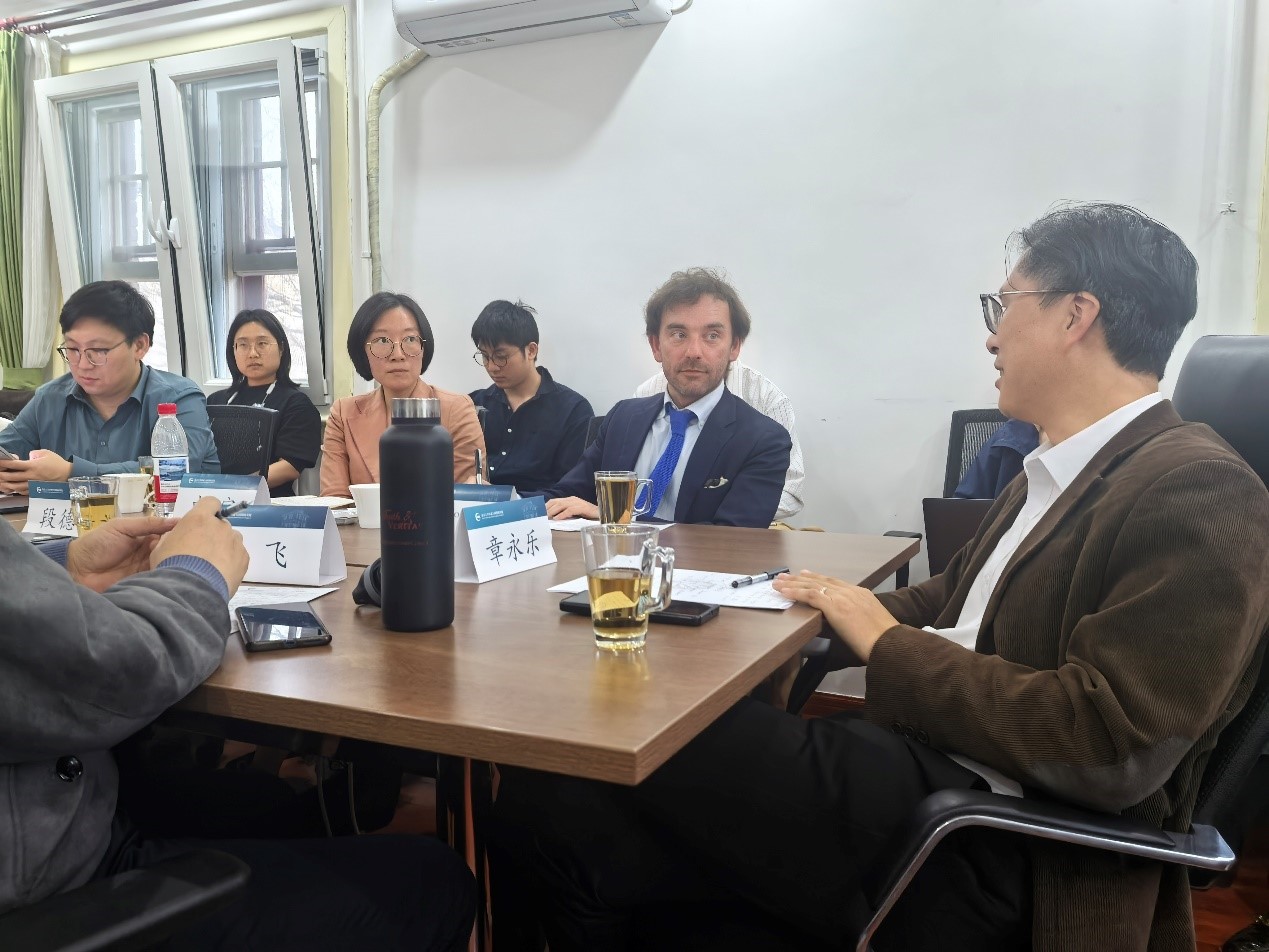
The 47th lecture in the “Adventus Amicorum” series, titled “Europe’s Future and China’s Past,” was held by the Institute of Area Studies, Peking University (PKUIAS) on March 24, 2025. The lecture was given by Lorenzo Marsili, an Italian philosopher and social activist. PKU professors Wu Fei (Philosophy) and Duan Demin and Pang Liang (School of Government), and University of Kassel Professor You Mi (Art and Economies) participated in the discussion. The lecture was hosted by Prof. Zhang Yongle, deputy director of PKUIAS.
Marsili pointed out that the world today was increasingly moving toward multipolarity. Per Marsili, we are no longer living in an era like the 19th and 20th centuries, when a handful of Western nations could impose hegemony over the entire world. This geopolitical shift, in a philosophical sense, presents an opportunity to transcend nationalism, achieve global commonality, and move toward a multipolar order. However, if emerging powers such as China and India fail to seize this opportunity and instead succumb to narrow nationalist politics, the world risks replicating the catastrophic history of early 19th–20th century Europe, escalating Europe’s past wars and hatreds to a global scale. What should have remained a historical lesson from 19th-century Europe could then become the future of China and the world at large. Marsili referenced the allegory from Borges’ short story Deutsches Requiem, in which a convicted Nazi general believes Germany actually won the war. Marsili also cited Heidegger’s warning about the “end of philosophy.” He argued that we must guard against mutual mimicry bred by confrontation, as well as the extreme mechanization of technical-rational thinking, which could lead to a tyranny of technology over humanity.
Wu Fei suggested that European nations shared a common cultural heritage rooted in ancient Greek, Roman, and Christian traditions, making it easier for them to achieve a certain degree of unity. Per him, the current level of coordination within the European Union owes much to this shared background of culture and values. However, promoting commonality on a global scale is far more challenging. Perhaps, rather than attempting to construct a global commonality, harmonious coexistence among major civilizations is a more desirable goal.
Duan Demin argued that while proposing a global vision for a “post-nationalist” or “post-Westphalian” order may sound ideal, even the European Union had not truly transcended nationalist politics. He said that one of the key reasons the EU has held together up till now is the relative decline of the European powers after World War II and the geopolitical threats posed by US–Soviet rivalry. Additionally, the security guarantees provided by the US have been indispensable. However, with recent policy shifts under the Trump administration, European nations are now pursuing greater strategic autonomy, and even Germany is rearming and strengthening its defense preparedness. Given these developments, the notion of a global universal order may be overly optimistic.
Pang Liang pointed out that during the Enlightenment, China’s image played a significant role in the theories of many European thinkers, such as in Voltaire’s Essay on Universal History; meanwhile, Kant not only proposed a vision for international order but also constructed a cosmopolitan ideal upon it, embracing universalism and national diversity through the concept of “Hospitalität.” This provides us with a possible pathway to reflect, from historical and philosophical perspectives, on the current tension between universalism and nationalism.
Zhang Yongle argued that Marsili strategically framed his narrative under the title “Europe’s Future and China’s Past” to tell a story about “Europe’s Past and China’s Future.” Marsili presented a symmetrical account: In the 20th century, those in China who followed the Strategies of the Warring States school (Zhanguoce pai) sought analytical models from China’s Spring and Autumn and Warring States periods to interpret the present and future of Europe, and even the world. Their predictions of interstate rivalry and annexation were criticized not only by Chinese socialists at the time but also by New Confucians like Qian Mu, with both critical perspectives raising the issue of freedom and liberation for oppressed nations. As Europe and China work toward constructing a global commonality, it is essential to incorporate perspectives from the Global South.
You Mi noted that as a Chinese scholar living and working in Europe, she had a more personal understanding of China–Europe relations, whose development was closely tied to her own life and work. Per You Mi, rebuilding ties with Europe requires a shift in narrative. Many Chinese people recognize or hope that Europe can grow stronger and more autonomous, and become an independent actor. However, this narrative should not carry a tone of schadenfreude or self-satisfaction, but should instead begin from a perspective of understanding others, thereby fostering common ground.
Wu Fei subsequently responded to the remarks made by Zhang Yongle and Marsili, noting that Fei Xiaotong also suggested in the 1990s that the global situation at that time resembled China's Spring and Autumn and Warring States periods. It was in such an era of intense contention that Confucius emerged, proposing a vision of harmonious coexistence. Today, China likewise hopes to offer a similar solution for the world. Unlike the Western missionaries of the 18th to 20th centuries, who were often associated with colonialism, traditional Chinese thought contains far fewer elements of aggression and coercion. Many Westerners mistakenly interpret China’s diplomatic, economic, and cultural activities in Africa as a form of neocolonialism — a misunderstanding rooted in their lack of familiarity with traditional Chinese culture.
Following the discussion between the participating scholars and Marsili, the audience members enthusiastically raised questions, engaging in animated discussion. Marsili thoughtfully responded to each inquiry in turn.


